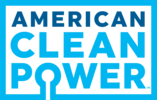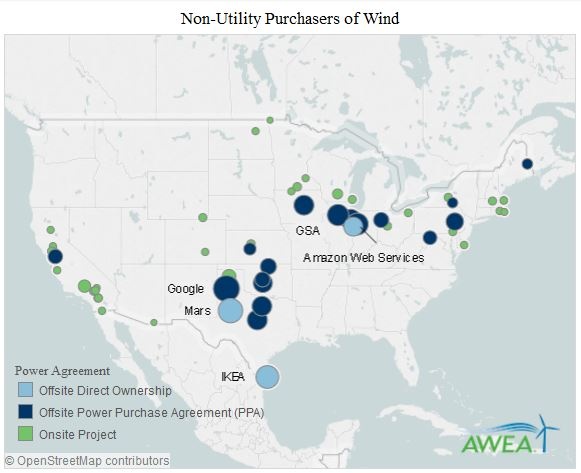News Release from American Clean Power Association (ACP)
Wind Industry Profile of
AWEA Blog - Google’s newest purchase highlights the wind industry’s progress
Google is the latest to add more wind power, purchasing one of the first wind farms in the world, which project owner NextEra Energy Resources will repower with modern turbines that will produce an equal amount of energy with far fewer units, which do so with far lower wildlife impacts.
Google was one of the first non-utility companies to invest in wind and has been doing so ever since, both through power purchase agreements (PPAs) and direct project investment. This week, it announced a PPA that will provide enough electricity for the entire energy usage of its Mountain View, Calif. headquarters. The map below illustrates how a host of companies and organizations have also found the win-win benefits of wind power—energy for their operations that’s not only clean but affordable and comes with stable prices they can count on for years to come.
This week’s announcement, though, brought a couple of new twists. Google entered the 43-megawatt PPA for power coming from the iconic Bay Area wind farm at California’s Altamont Pass, which was built in the 1980’s as one of the first utility-scale wind farms. However, those older, first-generation, lattice tower-type turbines will not be providing the electricity. Rather, by the time the PPA kicks in in 2016, NextEra will have repowered the project with modern wind turbines (sleek towers and all) boasting the latest technology and relying on improved siting practices.
The PPA and repowering, therefore, is symbolic of the industry’s relentless technology advance, which continues to this day. Fewer turbines, operating at greater heights and sited further apart with the state-of-the-art techniques and industry experience accumulated across three decades, will be producing the energy this time around.
Altamont Pass’s wind projects were developed at a time when the industry had little understanding of wildlife risks and how to avoid and minimize them through siting practices and related measures. The advancement of industry knowledge since the earliest days of facility development, in the form of both technology, siting techniques, as well as avoidance, minimization and mitigation measures, will allow the repowered wind farm to operate with far less impact on birds and other wildlife.
Notes Google on its official blog, “Once the installation is complete, and the 370 legacy turbines are replaced, it will take just 24 new ones to generate as much power as our campus uses in a year. Talk about doing more with less.”
We couldn’t have said it better ourselves.
To receive more information on this article, our Newsletter or find out more about what w3.windfair.net has to offer, please, do not hesitate to contact Trevor Sievert at ts@windfair.net.
Please don't forget to follow us on Twitter: w3.windfair.net on Twitter
w3.windfair.net is the largest international B2B internet platform in wind energy – ultimately designed for connecting wind energy enthusiasts and companies across the globe.
- Source:
- American Wind Energy Association
- Author:
- Edited by Trevor Sievert, Online Editorial Journalist / by AWEA Staff / Carl Levesque
- Email:
- windmail@awea.org
- Link:
- www.aweablog.org/...


